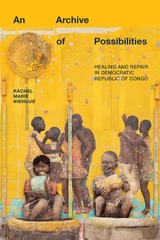446 scholarly books by Seagull Books and 20
have author last names that start with R
446 scholarly books by Seagull Books and 20
446 scholarly books by Seagull Books
20 have author last names that start with R have author last names that start with R
20 have author last names that start with R have author last names that start with R
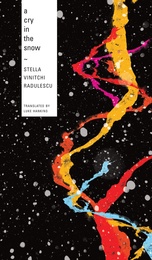
A Cry in the Snow
and Other Poems
Stella Vinitchi Radulescu
Seagull Books, 2018
Stella Vinitchi Radulescu’s poetry dwells in spaces of paradox, seeking out the words, metaphors, and images that capture both the peaceful stillness of snow and the desperate cry of human experience. A Cry in the Snow often draws on these two fertile tropes: the beauty of nature and the power and limitations of language. A trilingual poet who has published in French, English, and her native Romanian, Radulescu seeks to harness the elemental aspects of human experience, working between language and the mysterious power of silence. Combining poems from two French-language collections, Un Cri dans la neige (A Cry in the Snow) and a poetic prose sequence, Journal aux yeux fermés (Journal with Closed Eyes), this collection presents the distinctive and powerful French poems of Stella Vinitchi Radulescu to an English-language readership for the first time.
[more]
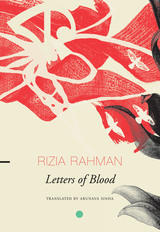
Letters of Blood
Rizia Rahman
Seagull Books
Bengali writer Riza Rahman is the author of more than fifty novels, as well as countless short stories, set in Bangladesh and bringing to life the difficult, mostly forgotten lives of its poorest and most disadvantaged citizens. Letters of Blood is set in the often violent world of prostitution in Bangladesh. Rahman brings great sensitivity and insight to her chronicles of the lives of women trapped in that bleak world as they face the constant risk of physical abuse, disease, and pregnancy, while also all too often struggling with drug addiction. A powerful, unforgettable story, Letters of Blood shows readers a hard way of life, imbuing the stories of these women with unforgettable empathy and compassion.
[more]
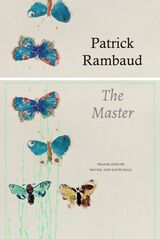
The Master
Patrick Rambaud
Seagull Books, 2023
The extraordinary life of Zhuang Zhou sits halfway between fable and philosophy.
“It was twenty-five centuries ago in the land of Song, between the Yellow River and the River Huai: Zhuang Zhou was born without a cry with his eyes wide open.”
Welcome to China in the fifth century BCE, a colorful, violent, unstable world into which Zhuang is born. Here royals raise huge armies, constantly waging wars against one another. They have slaves, concubines. Gold is everywhere. And so is hunger. Born rich and entitled, Zhuang learns to refuse any official function. His travels bring him closer to ordinary people, from whom he learns how to live a simple and useful life. This is how he will become one of the greatest Chinese philosophers who gave his name to his legendary book, the Zhuangzi, one of the two foundational texts of Taoism—a magnificent procession of lively stories in which we meet dwarfs, virtuous bandits, butchers, powerful lords in their castles, turtles, charming concubines, and false sages. In this remarkable bildungsroman, award-winning French novelist Patrick Rambaud spins out the extraordinary life of Zhuang Zhou—a poetic, cruel, and often humorous tale, halfway between fable and philosophy.
“It was twenty-five centuries ago in the land of Song, between the Yellow River and the River Huai: Zhuang Zhou was born without a cry with his eyes wide open.”
Welcome to China in the fifth century BCE, a colorful, violent, unstable world into which Zhuang is born. Here royals raise huge armies, constantly waging wars against one another. They have slaves, concubines. Gold is everywhere. And so is hunger. Born rich and entitled, Zhuang learns to refuse any official function. His travels bring him closer to ordinary people, from whom he learns how to live a simple and useful life. This is how he will become one of the greatest Chinese philosophers who gave his name to his legendary book, the Zhuangzi, one of the two foundational texts of Taoism—a magnificent procession of lively stories in which we meet dwarfs, virtuous bandits, butchers, powerful lords in their castles, turtles, charming concubines, and false sages. In this remarkable bildungsroman, award-winning French novelist Patrick Rambaud spins out the extraordinary life of Zhuang Zhou—a poetic, cruel, and often humorous tale, halfway between fable and philosophy.
[more]
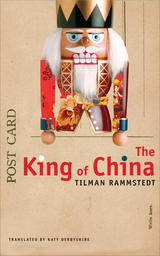
The King of China
Tilman Rammstedt
Seagull Books, 2019
When Keith Stapperpfennig and his family give their grandfather the trip of a lifetime—an all expenses paid holiday to any destination in the world—the eccentric old man arbitrarily chooses China, and he asks Keith to accompany him. But when Keith loses all the money for the journey at a casino, he goes into hiding—mostly under his desk—and his grandfather—equally uninterested in actually traveling to China—heads down the road to engage in a similar subterfuge.
And it is here that the novel opens, two men in hiding, mere miles apart. But when his grandfather dies unexpectedly, Keith is left to continue the farce alone. With the aid of a guidebook, Keith writes a series of letters home to his brothers and sisters, detailing their imaginary travels and the bizarre sights they see. These start off harmlessly, but before long he starts adding invented details: non-stop dental hygiene shows on television, dog vaccinations at the post office—and the letters get longer and longer. Engaging, strange, and ultimately moving, this hilarious novel from Tilman Rammstedt won him the prestigious Ingeborg Bachmann Prize in 2008 and confirmed him as one of Germany’s most compelling writers.
And it is here that the novel opens, two men in hiding, mere miles apart. But when his grandfather dies unexpectedly, Keith is left to continue the farce alone. With the aid of a guidebook, Keith writes a series of letters home to his brothers and sisters, detailing their imaginary travels and the bizarre sights they see. These start off harmlessly, but before long he starts adding invented details: non-stop dental hygiene shows on television, dog vaccinations at the post office—and the letters get longer and longer. Engaging, strange, and ultimately moving, this hilarious novel from Tilman Rammstedt won him the prestigious Ingeborg Bachmann Prize in 2008 and confirmed him as one of Germany’s most compelling writers.
[more]
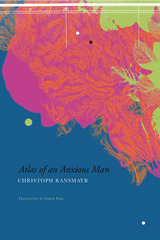
Atlas of an Anxious Man
Christoph Ransmayr
Seagull Books, 2015
In The Atlas of an Anxious Man, Christoph Ransmayr offers a mesmerizing travel diary—a sprawling tale of earthly wonders seen by a wandering eye. This is an exquisite, lyrically told travel story.
Translated by Simon Pare, this unique account follows Ransmayr across the globe: from the shadow of Java’s volcanoes to the rapids of the Mekong and Danube Rivers, from the drift ice of the Arctic Circle to Himalayan passes, and on to the disenchanted islands of the South Pacific. Ransmayr begins again and again with, “I saw. . .” recounting to the reader the stories of continents, eras, and landscapes of the soul. Like maps, the episodes come together to become a book of the world—one that charts the life and death, happiness and fate of people bound up in images of breathtaking beauty.
“One of the German language’s most gifted young novelists.”—Library Journal, on The Terrors of Ice and Darkness
Translated by Simon Pare, this unique account follows Ransmayr across the globe: from the shadow of Java’s volcanoes to the rapids of the Mekong and Danube Rivers, from the drift ice of the Arctic Circle to Himalayan passes, and on to the disenchanted islands of the South Pacific. Ransmayr begins again and again with, “I saw. . .” recounting to the reader the stories of continents, eras, and landscapes of the soul. Like maps, the episodes come together to become a book of the world—one that charts the life and death, happiness and fate of people bound up in images of breathtaking beauty.
“One of the German language’s most gifted young novelists.”—Library Journal, on The Terrors of Ice and Darkness
[more]
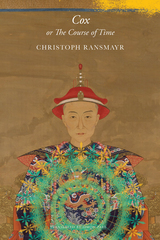
Cox
or, The Course of Time
Christoph Ransmayr
Seagull Books, 2020
Richly imagined and recounted in vivid prose of extraordinary beauty, this book is a stunning illustration of Ransmayr’s talent for imbuing a captivating tale with intense metaphorical, indeed metaphysical force.
The world’s most powerful man, Qiánlóng, emperor of China, invites the famous eighteenth-century clockmaker Alister Cox to his court in Beijing. There, in the heart of the Forbidden City, the Englishman and his assistants are to build machines that mark the passing of time as a child or a condemned man might experience it and that capture the many shades of happiness, suffering, love, and loss that come with that passing.
Mystified by the rituals of a rigidly hierarchical society dominated by an unimaginably wealthy, god-like ruler, Cox musters all his expertise and ingenuity to satisfy the emperor’s desires. Finally, Qiánlóng, also known by the moniker Lord of Time, requests the construction of a clock capable of measuring eternity—a perpetuum mobile. Seizing this chance to realize a long-held dream and honor the memory of his late beloved daughter, yet conscious of the impossibility of his task, Cox sets to work. As the court is suspended in a never-ending summer, festering with evil gossip about the monster these foreigners are creating, the Englishmen wonder if they will ever escape from their gilded cage. More than a meeting of two men, one isolated by power, the other by grief, this is an exploration of mortality and a virtuoso demonstration that storytelling alone can truly conquer time.
The world’s most powerful man, Qiánlóng, emperor of China, invites the famous eighteenth-century clockmaker Alister Cox to his court in Beijing. There, in the heart of the Forbidden City, the Englishman and his assistants are to build machines that mark the passing of time as a child or a condemned man might experience it and that capture the many shades of happiness, suffering, love, and loss that come with that passing.
Mystified by the rituals of a rigidly hierarchical society dominated by an unimaginably wealthy, god-like ruler, Cox musters all his expertise and ingenuity to satisfy the emperor’s desires. Finally, Qiánlóng, also known by the moniker Lord of Time, requests the construction of a clock capable of measuring eternity—a perpetuum mobile. Seizing this chance to realize a long-held dream and honor the memory of his late beloved daughter, yet conscious of the impossibility of his task, Cox sets to work. As the court is suspended in a never-ending summer, festering with evil gossip about the monster these foreigners are creating, the Englishmen wonder if they will ever escape from their gilded cage. More than a meeting of two men, one isolated by power, the other by grief, this is an exploration of mortality and a virtuoso demonstration that storytelling alone can truly conquer time.
[more]
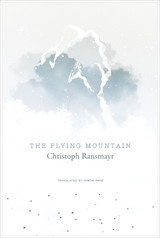
The Flying Mountain
Christoph Ransmayr
Seagull Books, 2019
In a publishing world that is all too full of realist novels written in undistinguished prose, discernible only by their covers, The Flying Mountain stands out—if for no other reason than that it consists entirely of blank verse. And that form is most suitable for the epic voyage Christoph Ransmayr relates: The Flying Mountain tells the story of two brothers who leave the southwest coast of Ireland on an expedition to Transhimalaya, the land of Kham, and the mountains of eastern Tibet—looking for an untamed, unnamed mountain that represents perhaps the last blank spot on the map. As they advance toward their goal, the brothers find their past, and their rivalry, inescapable, inflecting every encounter and decision as they are drawn farther and farther from the world they once knew.
Only one of the brothers will return. Transformed by his loss, he starts life anew, attempting to understand the mystery of love, yet another quest that may prove impossible. The Flying Mountain is thrilling, surprising, and lyrical by turns; readers looking for something truly new will be rewarded for joining Ransmayr on this journey.
Only one of the brothers will return. Transformed by his loss, he starts life anew, attempting to understand the mystery of love, yet another quest that may prove impossible. The Flying Mountain is thrilling, surprising, and lyrical by turns; readers looking for something truly new will be rewarded for joining Ransmayr on this journey.
[more]

The Lockmaster
Christoph Ransmayr
Seagull Books, 2024
A suspenseful novel that delves into the complexities of a father-son relationship and the timeless themes of guilt and forgiveness.
A longboat plummets over the Great Falls, drowning the five passengers on board. The Lockmaster, the heir to an ancient title and responsible for guiding river traffic safely around this natural barrier on the White River, ought to have prevented this tragedy. His son is convinced that it was not an accident. Is his irascible father a murderer? A hydraulic engineer all too familiar with the brute force of rivers, he sets out to discover the truth and find his missing father.
The Lockmaster is a dramatic tale set in a world where water has become a precious commodity and Europe has fractured into warring ethno-nationalist entities desperate to uphold the traditions and insignia of a so-called glorious bygone era. Christoph Ransmayr recounts this story in his trademark style, its epic force shot through with visions of future technology and reactionary politics amid a climate breakdown. At heart, though, this novel is the story of a father–son relationship straddling the fault lines between past and present, and an exploration of timeless questions of guilt and forgiveness.
A longboat plummets over the Great Falls, drowning the five passengers on board. The Lockmaster, the heir to an ancient title and responsible for guiding river traffic safely around this natural barrier on the White River, ought to have prevented this tragedy. His son is convinced that it was not an accident. Is his irascible father a murderer? A hydraulic engineer all too familiar with the brute force of rivers, he sets out to discover the truth and find his missing father.
The Lockmaster is a dramatic tale set in a world where water has become a precious commodity and Europe has fractured into warring ethno-nationalist entities desperate to uphold the traditions and insignia of a so-called glorious bygone era. Christoph Ransmayr recounts this story in his trademark style, its epic force shot through with visions of future technology and reactionary politics amid a climate breakdown. At heart, though, this novel is the story of a father–son relationship straddling the fault lines between past and present, and an exploration of timeless questions of guilt and forgiveness.
[more]
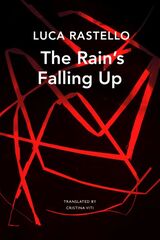
The Rain's Falling Up
Luca Rastello
Seagull Books, 2022
A beautifully crafted novel set in the late 1960s and 1970s Italy, a tempestuous period that shaped the lives of generations to come in many countries.
What was it really like to be a teenager growing up in Italy in the 1970s, during a time it has become all too easy to file away under “years of lead,” as the fathers’ betrayed ideals came face to face with the sons’ and daughters’ rebellions? What was happening in schools, in assemblies, social centers, and occupied factories as the postwar “economic miracle” was being dismantled from within? What moved the foremost French intellectuals of the time to sign an appeal against the repression of the student and workers’ movement in Italy? What did the bullets and heroin bring to a halt, and where did they come from? How does it feel when strategies of terror and police brutality become as ordinary as a TV dinner and as eerie as the plots of the science fiction novels you are plagiarizing to impress a girl? How are metropolitan geographies alchemized in the muscles of a young body crossing the shady lines between ages and sexes?
Luca Rastello raises these and other questions in an astonishing novel that splices chunks of plot and historical reconstruction into the free flow of memory and dream. Rain’s Falling Up tracks the trajectory of a generation while refusing to romanticize its protagonists or resolve the tensions that powered its volatile energy.
What was it really like to be a teenager growing up in Italy in the 1970s, during a time it has become all too easy to file away under “years of lead,” as the fathers’ betrayed ideals came face to face with the sons’ and daughters’ rebellions? What was happening in schools, in assemblies, social centers, and occupied factories as the postwar “economic miracle” was being dismantled from within? What moved the foremost French intellectuals of the time to sign an appeal against the repression of the student and workers’ movement in Italy? What did the bullets and heroin bring to a halt, and where did they come from? How does it feel when strategies of terror and police brutality become as ordinary as a TV dinner and as eerie as the plots of the science fiction novels you are plagiarizing to impress a girl? How are metropolitan geographies alchemized in the muscles of a young body crossing the shady lines between ages and sexes?
Luca Rastello raises these and other questions in an astonishing novel that splices chunks of plot and historical reconstruction into the free flow of memory and dream. Rain’s Falling Up tracks the trajectory of a generation while refusing to romanticize its protagonists or resolve the tensions that powered its volatile energy.
[more]
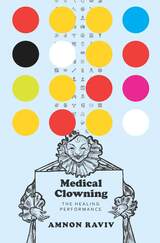
Medical Clowning
The Healing Performance
Amnon Raviv
Seagull Books, 2016
Clowns are not just the stuff of backyard children’s parties anymore. These days, clown doctors see patients—especially children—to introduce humor and imagination into an anxiety-filled and painful experience. The origins of medical clowning can be traced to the Big Apple Circus Clown Care Unit at the Infants and Children’s Hospital of New York, established about thirty years ago. Since that time, the practice has developed extensively and medical clowns now work in hospitals around the world. Over the past ten years, the number of scientific studies on medical clowning has increased, with findings showing the important contribution of medical clowns to children and adults suffering from mild to incurable illnesses.
Medical Clowning is the first guide to this phenomenon, summing up decades of research, education, and practice to give readers a comprehensive look into this innovative field. Amnon Raviv analyzes the performance of medical clowns, looking at research and case studies, and goes on to propose a training and evaluation model, including hands-on exercises to train experienced clowns for work in hospitals.
Medical Clowning is the first guide to this phenomenon, summing up decades of research, education, and practice to give readers a comprehensive look into this innovative field. Amnon Raviv analyzes the performance of medical clowns, looking at research and case studies, and goes on to propose a training and evaluation model, including hands-on exercises to train experienced clowns for work in hospitals.
[more]

Manon's World
A Hauntology of a Daughter in the Triangle of Alma Mahler, Walter Gropius and Franz Werfel
James Reidel
Seagull Books, 2020
At once a narrative biography and a medical history, Manon’s World tells the story of a haunted young woman caught in the middle of a love triangle in interwar Germany.
Manon Gropius (1916–1935) was the daughter of Alma Mahler, the widow of Gustav Mahler, and the architect Walter Gropius, the founder of the Bauhaus, and the stepdaughter of the writer Franz Werfel. In Manon’s World, James Reidel explores the life and death of a child at the center of a broken love triangle. The story takes a unique course, describing a peripheral figure but in a context where her significance and centrality in the lives of her famous parents and circles comes into relief. Reidel reveals a neglected and fascinating life in a world gone by—Vienna, Venice, and Berlin of the interwar years.
Not just a narrative biography, Manon’s World is also a medical history of the polio that killed Manon and a personal cultural history of the aspirations projected on her—and seen as lost by such keen observers as Elias Canetti, who devoted two chapters of his Nobel Prize–winning memoirs to his encounters with Manon and her funeral. That event led Alban Berg to dedicate his signature Violin Concerto “to an angel.” Reidel reveals a more complex image of a young woman who desired to be an actress and artist in her own right despite being her mother’s intended protégé, an inspiration to her father who rarely saw her, and her stepfather Franz Werfel, who obsessively wrote her into his novels, beginning with The Forty Days of Musa Dagh and as a revenant in all the books that followed.
Manon Gropius (1916–1935) was the daughter of Alma Mahler, the widow of Gustav Mahler, and the architect Walter Gropius, the founder of the Bauhaus, and the stepdaughter of the writer Franz Werfel. In Manon’s World, James Reidel explores the life and death of a child at the center of a broken love triangle. The story takes a unique course, describing a peripheral figure but in a context where her significance and centrality in the lives of her famous parents and circles comes into relief. Reidel reveals a neglected and fascinating life in a world gone by—Vienna, Venice, and Berlin of the interwar years.
Not just a narrative biography, Manon’s World is also a medical history of the polio that killed Manon and a personal cultural history of the aspirations projected on her—and seen as lost by such keen observers as Elias Canetti, who devoted two chapters of his Nobel Prize–winning memoirs to his encounters with Manon and her funeral. That event led Alban Berg to dedicate his signature Violin Concerto “to an angel.” Reidel reveals a more complex image of a young woman who desired to be an actress and artist in her own right despite being her mother’s intended protégé, an inspiration to her father who rarely saw her, and her stepfather Franz Werfel, who obsessively wrote her into his novels, beginning with The Forty Days of Musa Dagh and as a revenant in all the books that followed.
[more]
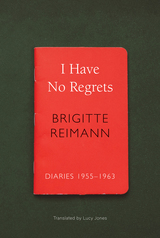
I Have No Regrets
Diaries, 1955-1963
Brigitte Reimann
Seagull Books, 2019
Frank and refreshing, Brigitte Reimann’s collected diaries provide a candid account of life in socialist Germany.
With an upbeat tempo and amusing tone, I Have No Regrets contains detailed accounts of the author’s love affairs, daily life, writing, and reflections. Like the heroines in her stories, Reimann was impetuous and outspoken, addressing issues and sensibilities otherwise repressed in the era of the German Democratic Republic. She followed the state’s call for artists to leave their ivory towers and engage with the people, moving to the new town of Hoyerswerda to work part-time at a nearby industrial plant and run writing classes for the workers. Her diaries and letters provide a fascinating parallel to her fictional writing. By turns shocking, passionate, unflinching, and bitter—but above all life-affirming—they offer an unparalleled insight into what life was like during the first decades of the GDR.
With an upbeat tempo and amusing tone, I Have No Regrets contains detailed accounts of the author’s love affairs, daily life, writing, and reflections. Like the heroines in her stories, Reimann was impetuous and outspoken, addressing issues and sensibilities otherwise repressed in the era of the German Democratic Republic. She followed the state’s call for artists to leave their ivory towers and engage with the people, moving to the new town of Hoyerswerda to work part-time at a nearby industrial plant and run writing classes for the workers. Her diaries and letters provide a fascinating parallel to her fictional writing. By turns shocking, passionate, unflinching, and bitter—but above all life-affirming—they offer an unparalleled insight into what life was like during the first decades of the GDR.
[more]
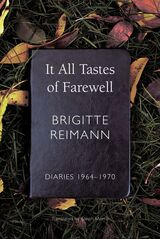
It All Tastes of Farewell
Diaries, 1964–1970
Brigitte Reimann
Seagull Books, 2016
Continuing where Reimann's earlier book of diaries, I Have No Regrets, left off, in 1964, this volume is a compelling and frank account of one woman’s life and loves in 1960s East Germany.
It All Tastes of Farewell is a frank account of one woman’s life and loves in 1960s East Germany. As a writer, Brigitte Reimann could not help but tell a compelling story, and that is born out here in her diaries, which are gripping as any novel. She recorded only what mattered: telling details, emotional truths, and political realities. Never written for publication and first published in full in German only after the fall of the Berlin Wall, these diaries offer a unique record of what it felt like to live in a country that no longer exists, was represented for years largely through Cold War propaganda, and is still portrayed in fairy-tale Stasi dramas. Here we get a sense of lived experience as if Doris Lessing or Edna O’Brien had been allowed in with their notebooks. This volume continues where her earlier book of diaries, I Have No Regrets, left off, in 1964. It sees Reimann grow wistful and at times bitter, as her love life, her professional life, and her health all suffer. Yet throughout she retains a lively appetite for new experiences and a dedication to writing. Finally, she finds security in a surprising new love, and although she died soon after this volume ends, the novel she was writing was to become a much-read cult hit after her death.
A remarkable document from a time and place that we still struggle to see clearly, It All Tastes of Farewell is unforgettable, a last gift from an essential writer.
It All Tastes of Farewell is a frank account of one woman’s life and loves in 1960s East Germany. As a writer, Brigitte Reimann could not help but tell a compelling story, and that is born out here in her diaries, which are gripping as any novel. She recorded only what mattered: telling details, emotional truths, and political realities. Never written for publication and first published in full in German only after the fall of the Berlin Wall, these diaries offer a unique record of what it felt like to live in a country that no longer exists, was represented for years largely through Cold War propaganda, and is still portrayed in fairy-tale Stasi dramas. Here we get a sense of lived experience as if Doris Lessing or Edna O’Brien had been allowed in with their notebooks. This volume continues where her earlier book of diaries, I Have No Regrets, left off, in 1964. It sees Reimann grow wistful and at times bitter, as her love life, her professional life, and her health all suffer. Yet throughout she retains a lively appetite for new experiences and a dedication to writing. Finally, she finds security in a surprising new love, and although she died soon after this volume ends, the novel she was writing was to become a much-read cult hit after her death.
A remarkable document from a time and place that we still struggle to see clearly, It All Tastes of Farewell is unforgettable, a last gift from an essential writer.
[more]
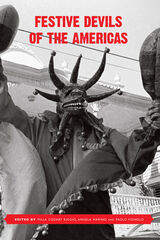
Festive Devils of the Americas
Milla Cozart Riggio
Seagull Books, 2015
The devil is a defiant, nefarious figure, the emblem of evil, and harbinger of the damned. However, the festive devil—the devil that dances—turns the most hideous acts into playful transgressions. Festive Devils of the Americas is the first volume to present a transnational and performance-centered approach to this fascinating, feared, and revered character of fiestas, street festivals, and carnivals in North, Central, and South America. As produced and performed in both rural and urban communities and among neighborhood groups and councils, festive devils challenge the principles of colonialism and nation-states reliant on the straight and narrow opposition between good and evil, black and white, and us and them.
Each section of this volume opens with regional maps ranging from the Andes, Afro-Atlantic, and Caribbean, to Central and North America. However, festive devils defy geographical as well as moral boundaries. From Brazil’s Candomblé to New Mexico’s dance halls, festive devils and their stories sustain and transform ancestral memory, recast historical narratives, and present political, social, and cultural alternatives in many guises. Within economic, political, and religious cross-currents, these paradoxical figures affirm the spirit of community within the framework of subversion and inversion found at the heart of the festival world.
Each section of this volume opens with regional maps ranging from the Andes, Afro-Atlantic, and Caribbean, to Central and North America. However, festive devils defy geographical as well as moral boundaries. From Brazil’s Candomblé to New Mexico’s dance halls, festive devils and their stories sustain and transform ancestral memory, recast historical narratives, and present political, social, and cultural alternatives in many guises. Within economic, political, and religious cross-currents, these paradoxical figures affirm the spirit of community within the framework of subversion and inversion found at the heart of the festival world.
[more]

Letters around a Garden
Rainer Maria Rilke
Seagull Books, 2024
An intimate glimpse into the life and letters of Rainer Maria Rilke, one of the most important poets of the twentieth century.
In July 1921, displaced European poet Rainer Maria Rilke sequestered himself in the chateau of Muzot, a thirteenth-century medieval tower perched in the vineyards above the town of Sierre in the Canton Valais, Switzerland. In this sun-flooded landscape of the Rhone Valley, he found beguiling echoes of Spain and his beloved Provence. Here, the Duino Elegies were famously completed and the Sonnets to Orpheus followed.
During this time, Rilke’s correspondence also bloomed, and Letters around a Garden collects some of those letters together into English for the first time. One intriguing exchange from 1924 to 1926 was with a young aristocratic Swiss woman Antoinette de Bonstetten, a passionate horticulturist who had been recommended as a potential advisor for the redesign and upkeep of the Muzot rose garden. In twenty-two precious letters originally written in French, Rilke relishes the prospect of their elusive meeting, keenly discusses the plans for his garden, and wittily laments the trials of his plants. Beyond the encomium for Paul Valéry and poignant memory of place are passages of exquisite writing, in which Rilke evokes with trademark sensitivity the delicate relationship between the changing seasons and the natural world of his adopted region. We also witness the loving relationship evolve between these sometime-fugitive correspondents and how questions of solitariness and companionship impinge on one who faces unaccustomed challenges as his health tragically declines.
In July 1921, displaced European poet Rainer Maria Rilke sequestered himself in the chateau of Muzot, a thirteenth-century medieval tower perched in the vineyards above the town of Sierre in the Canton Valais, Switzerland. In this sun-flooded landscape of the Rhone Valley, he found beguiling echoes of Spain and his beloved Provence. Here, the Duino Elegies were famously completed and the Sonnets to Orpheus followed.
During this time, Rilke’s correspondence also bloomed, and Letters around a Garden collects some of those letters together into English for the first time. One intriguing exchange from 1924 to 1926 was with a young aristocratic Swiss woman Antoinette de Bonstetten, a passionate horticulturist who had been recommended as a potential advisor for the redesign and upkeep of the Muzot rose garden. In twenty-two precious letters originally written in French, Rilke relishes the prospect of their elusive meeting, keenly discusses the plans for his garden, and wittily laments the trials of his plants. Beyond the encomium for Paul Valéry and poignant memory of place are passages of exquisite writing, in which Rilke evokes with trademark sensitivity the delicate relationship between the changing seasons and the natural world of his adopted region. We also witness the loving relationship evolve between these sometime-fugitive correspondents and how questions of solitariness and companionship impinge on one who faces unaccustomed challenges as his health tragically declines.
[more]
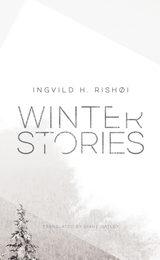
Winter Stories
Ingvild Rishøi
Seagull Books, 2018
In Winter Stories, Norwegian author Ingrid H. Rishøi gives us three contemporary tales about personal resilience in the face of adversity. We meet a teenager on the run from social services with her younger half-sister and half-brother in tow; a young single mother struggling to provide adequately for her daughter; and an ex-convict striving to overcome personal shortcomings and build a relationship with his son.
Driven by a fundamental need to secure and protect relationships with loved ones, Rishøi’s characters stumble, fall, and climb to their feet again—even though the deck inevitably seems to be stacked against them. Seemingly minor snags in their best-laid plans carry the risk of undermining everything with potentially life-altering consequences. What these stories illustrate, however, is how small victories and the unexpected compassion of virtual strangers can have a far-reaching and profound impact. With empathy and sensitivity, the poetic sensibility of Rishøi’s literary voice beautifully illuminates the fragile vulnerability of the human condition. In a time when the level of skepticism and distrust between people is rising, these stories remind us of the humanity that unites us all.
Driven by a fundamental need to secure and protect relationships with loved ones, Rishøi’s characters stumble, fall, and climb to their feet again—even though the deck inevitably seems to be stacked against them. Seemingly minor snags in their best-laid plans carry the risk of undermining everything with potentially life-altering consequences. What these stories illustrate, however, is how small victories and the unexpected compassion of virtual strangers can have a far-reaching and profound impact. With empathy and sensitivity, the poetic sensibility of Rishøi’s literary voice beautifully illuminates the fragile vulnerability of the human condition. In a time when the level of skepticism and distrust between people is rising, these stories remind us of the humanity that unites us all.
[more]

This Body That Inhabits Me
Rossana Rossanda
Seagull Books, 2022
A collection of essays on the mysteries of the body from one of Italy’s leading postwar communist intellectuals.
Politician, translator, and journalist Rossana Rossanda was the most important female left-wing intellectual in post-war Italy. Central to the Italian Communist Party’s cultural wing during the 1950s and ’60s, she left an indelible mark on the life of the mind. The essays in this volume, however, bring together Rossanda’s reflections on the body—how it ages, how it is gendered, what it means to examine one’s own body. The product of a decades-long dialogue with the Italian women’s movement (above all with Lea Melandri, a vital feminist writer who provides an afterword to the current volume), these essays represent an honest and raw meeting between communist and feminist thought. Ranging from reflections on her own hands through to Chinese cinema, from figures such as the Russian cross-dressing soldier Nadezhda Durova to the Jacobin revolutionary Theroigne de Mericourt, here we see Rossanda’s fierce intellect and extraordinary breadth of knowledge applied to the body as a central question of human experience.
Politician, translator, and journalist Rossana Rossanda was the most important female left-wing intellectual in post-war Italy. Central to the Italian Communist Party’s cultural wing during the 1950s and ’60s, she left an indelible mark on the life of the mind. The essays in this volume, however, bring together Rossanda’s reflections on the body—how it ages, how it is gendered, what it means to examine one’s own body. The product of a decades-long dialogue with the Italian women’s movement (above all with Lea Melandri, a vital feminist writer who provides an afterword to the current volume), these essays represent an honest and raw meeting between communist and feminist thought. Ranging from reflections on her own hands through to Chinese cinema, from figures such as the Russian cross-dressing soldier Nadezhda Durova to the Jacobin revolutionary Theroigne de Mericourt, here we see Rossanda’s fierce intellect and extraordinary breadth of knowledge applied to the body as a central question of human experience.
[more]

"Air of Solitude" Followed by "Requiem"
Gustave Roud
Seagull Books, 2019
Gustave Roud, perhaps the most beloved poet of Swiss Romandy, is widely considered the founder of modern francophone Swiss literature, along with Charles-Ferdinand Ramuz. Roud lived at his grandfather’s farm in Carrouge, Canton Vaud, for his entire life. In Air of Solitude, the first section of this two-part book, he stalks the structures and fields of his youth, composing memories out of his landscape. The narrator appears homegrown, expressing nostalgia for what is already in front of him. Yet, like an outsider, he remains distinctly elsewhere, unable to participate in the workday rituals of the men around him—a stalking shadow of unfulfilled yearning for affection and belonging. Air of Solitude explores the rural bodies and lives of the Vaudois, returning again and again to the desired male laborer Aimé.
Between each section of Air of Solitude, Roud inserts short vignettes that provide fleeting and lyrical images that resemble allusions to half-forgotten memories. However, Roud leaves the relationship between the titled sections and the interludes ambiguous. As the book concludes with Requiem, the remnants of narrative shatter, leaving behind only the spectral tatters of memory as Roud confronts the enigma of loss in peerless, jewel-studded elegiac prose. With these two tales, Roud revives the pastoral tradition and injects it with distinctly modernist anxiety and disillusionment.
Between each section of Air of Solitude, Roud inserts short vignettes that provide fleeting and lyrical images that resemble allusions to half-forgotten memories. However, Roud leaves the relationship between the titled sections and the interludes ambiguous. As the book concludes with Requiem, the remnants of narrative shatter, leaving behind only the spectral tatters of memory as Roud confronts the enigma of loss in peerless, jewel-studded elegiac prose. With these two tales, Roud revives the pastoral tradition and injects it with distinctly modernist anxiety and disillusionment.
[more]

As I Please
and Other Textual Journalism, 1997–2022
Martin Rowson
Seagull Books, 2024
British satirist and cartoonist Martin Rowson’s acerbic chronicles of the evolution—or rather, regression—of politics in the last two decades.
In 1997, on top of his regular visual contributions to the Tribune, Martin Rowson—the veteran mouthpiece of the Left of the British Labour Party—started writing a monthly column in the paper’s “As I Please” section, which was George Orwell’s slot fifty years earlier. Through his columns, Rowson chronicled the changing tides and tsunamis in the current political scene, documenting the rise of nationalism and the right-wing in these prescient musings. Over the next two decades, he pondered everything—the ideological battles inside Labour, the psychopathology of the Tory Party, the London Zoo, the British class system, Doctor Who, terrorism—and anything else that came to mind a day or so before the deadline.
Here, for the first time, a selection of these columns has been collected alongside Rowson’s other textual journalism, from tiny underground magazines in the United States to contributions to the Guardian, the Independent, and many other mainstream publications, on subjects ranging from the Charlie Hebdo massacre to his favorite books.
In 1997, on top of his regular visual contributions to the Tribune, Martin Rowson—the veteran mouthpiece of the Left of the British Labour Party—started writing a monthly column in the paper’s “As I Please” section, which was George Orwell’s slot fifty years earlier. Through his columns, Rowson chronicled the changing tides and tsunamis in the current political scene, documenting the rise of nationalism and the right-wing in these prescient musings. Over the next two decades, he pondered everything—the ideological battles inside Labour, the psychopathology of the Tory Party, the London Zoo, the British class system, Doctor Who, terrorism—and anything else that came to mind a day or so before the deadline.
Here, for the first time, a selection of these columns has been collected alongside Rowson’s other textual journalism, from tiny underground magazines in the United States to contributions to the Guardian, the Independent, and many other mainstream publications, on subjects ranging from the Charlie Hebdo massacre to his favorite books.
[more]
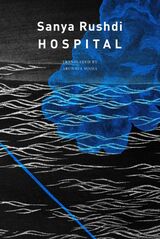
Hospital
Sanya Rushdi
Seagull Books, 2023
A strong and courageous novel that deftly tackles psychosis.
In Melbourne, Australia, a woman in her late thirties is diagnosed with her third episode of psychosis, amounting to schizophrenia. What follows is a frenzied journey from home to a community house to a hospital and out again. Sanya, the protagonist, finds herself questioning the diagnosis of her sanity or insanity, as determined and defined by a medical model which seems less than convincing to her. Having studied psychology herself, she wonders whether, even if the diagnosis is correct to some extent, the treatment should be different. Sanya tells her story in a deceptively calm, first-person voice, using conversations as the primary narrative mode, as she ponders if and when the next psychotic episode will materialize.
Based on real-life events and originally written in Bengali, Hospital is a daring first novel that unflinchingly depicts the precarity of a woman living with psychosis and her struggles with the definition of sanity in our society.
In Melbourne, Australia, a woman in her late thirties is diagnosed with her third episode of psychosis, amounting to schizophrenia. What follows is a frenzied journey from home to a community house to a hospital and out again. Sanya, the protagonist, finds herself questioning the diagnosis of her sanity or insanity, as determined and defined by a medical model which seems less than convincing to her. Having studied psychology herself, she wonders whether, even if the diagnosis is correct to some extent, the treatment should be different. Sanya tells her story in a deceptively calm, first-person voice, using conversations as the primary narrative mode, as she ponders if and when the next psychotic episode will materialize.
Based on real-life events and originally written in Bengali, Hospital is a daring first novel that unflinchingly depicts the precarity of a woman living with psychosis and her struggles with the definition of sanity in our society.
[more]
READERS
Browse our collection.
PUBLISHERS
See BiblioVault's publisher services.
STUDENT SERVICES
Files for college accessibility offices.
UChicago Accessibility Resources
home | accessibility | search | about | contact us
BiblioVault ® 2001 - 2024
The University of Chicago Press






